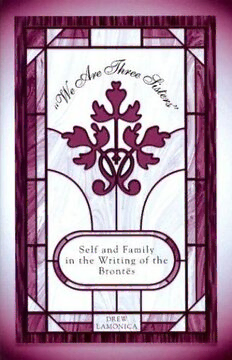
We Are Three Sisters: Self and Family in the Writing of the Brontes PDF
275 Pages·2003·1.066 MB·English
Most books are stored in the elastic cloud where traffic is expensive. For this reason, we have a limit on daily download.
Preview We Are Three Sisters: Self and Family in the Writing of the Brontes
Description:
While biographers have widely acknowledged the importance of family relationships to Charlotte, Emily, and Anne Bront? and to their writing processes, literary critics have yet to give extensive consideration to the family as a subject of the writing itself. In “We Are Three Sisters,” Drew Lamonica focuses on the role of families in the Bront?s’ fictions of personal development, exploring the ways in which their writings recognize the family as a defining community for selfhood. Drawing on extensive primary sources, including works by Sarah Ellis, Sarah Lewis, Ann Richelieu Lamb, Harriet Martineau, Thomas Carlyle, Charles Dickens, and Elizabeth Gaskell, Lamonica examines the dialogic relationship between the Bront?s’ novels and a mid-Victorian domestic ideology that held the family to be the principal nurturer of subjectivity. Using a sociohistorical framework, “We Are Three Sisters” shows that the Bront?s’ novels display a heightened awareness of contemporary female experience and the complex problems of securing a valued sense of selfhood not wholly dependent on family ties. The opening chapters discuss the mid-Victorian “culture of the family,” in which the Bront?s emerged as voices exploring the adequacy of the family as the site for personal, and particularly female, development. These chapters also introduce the Bront?s’ early collaborative writings, showing that the sisters’ shared interest in the family’s formative role arose from their own experience as a family of authors. Lamonica also examines the seldom-recognized influences of Patrick and Branwell Bront? on the development of the sisters’ writing. Of the numerous studies on the Bront?s, comparatively few consider all seven novels, and no previous study has undertaken to examine the Bront?s’ writing in the context of mid-Victorian ideas regarding the family—its relationships, roles, and responsibilities. Lamonica explores in detail the various constructions of family in the sisters’ novels, concluding that the Bront?s were attuned to complexities; they were not polemical writers with fixed feminist agendas. The Bront?s disputed the promotion of the family as the exclusive site for female development, morality, and fulfillment, without ever explicitly denying the possibility of domestic contentment. In doing so, the Bront?s continue to challenge our readings and our understanding of them as mid-Victorian women. “We Are Three Sisters” is an important addition to the study of these fascinating women and their novels.
See more
The list of books you might like
Most books are stored in the elastic cloud where traffic is expensive. For this reason, we have a limit on daily download.
